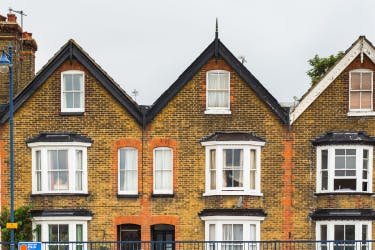What can stop you from getting a mortgage?
There are lots of obstacles that can stop you from getting a mortgage, such as a low income, poor credit score or difficulties with debt in the past. Let’s take a look at the most common reasons why a bank might not give you a mortgage and explore how you can boost your chances of meeting lenders’ affordability criteria.
Why would a bank not give you a mortgage?
There are various reasons why a bank might not give you a mortgage; you might not pass their affordability checks, have a high amount of debt, have a poor credit score or not meet the lender’s criteria.
When you apply for a mortgage, lenders will carry out a series of affordability checks to make sure you can afford the mortgage repayments. They’ll also do something called ‘stress testing’, which will assess whether your mortgage would still be affordable if your interest rate increased or you experienced a loss of income. If you fail a lender’s affordability checks, you may be offered a smaller mortgage or have your application rejected.
If you already have outstanding debt and the payments make up a significant portion of your income, you may find it harder to get a mortgage too. Lenders may be worried that you’ll borrow too much money and be unable to repay your mortgage. Having a low credit score can make it harder to get a mortgage as well, particularly if you have county court judgments (CCJs), individual voluntary agreements (IVAs) or you’ve ever been declared bankrupt. However it’s not impossible to get a mortgage even if you have large debts or even adverse credit.
Remember that even credit referencing agencies make mistakes, such as having you down as living at a different address, missing a credit card payment, or being financially linked to an ex-partner. So check your report with each of the three main credit referencing agencies (Transunion, Equifax and Experian) to make sure all your details are accurate. You can do this easily through a service called CheckMyFile, which collates your credit report from across these three credit referencing agencies.
Too much debt can make it hard to get a mortgage, but too little debt could have the same effect. If you’ve never borrowed money before, you’ll need to find ways to prove to lenders that you’re a responsible borrower. You could do this by taking out a credit card and repaying it in full each month (but speak to a mortgage broker first if you’re hoping to buy in the next 3 to 6 months).
Remember that any missed payments could cost you interest and make it harder to secure a mortgage.
When you’re looking for a new job, applying for lots of different roles can help you land a new role faster. Sadly, the same rule doesn’t apply when trying to get a mortgage. If you submit multiple applications within a short space of time, you’re actually more likely to get rejected because lenders see this as a sign you are desperate to borrow money. So, if you’d like to apply for a mortgage in the next six months or so, try to keep other credit applications to a minimum.
If you apply for a mortgage where you don’t meet the criteria for that mortgage product, you could also be rejected by the lender. For example, you might not meet the minimum deposit requirements. Most lenders will want a deposit of at least 10%, but it may be possible to get a mortgage with a 5% deposit thanks to the return of 95% mortgages. It is also possible to get a mortgage with no deposit at all! Working with a mortgage broker can help you avoid applying for mortgages you are not eligible for and discover schemes which could help you boost your affordability!
Another reason you might not meet the mortgage criteria is due to your age. You need to be 18 or older to get a residential mortgage. The maximum age for a mortgage varies from one product to another, with individual lenders setting their own benchmarks. Most will place a cap somewhere between age 65 and 80, but it may be possible to get a mortgage up to age 90. It’s a good idea to speak to a mortgage broker to weigh up your options and make sure you’re considering all later-life lending options available.
If you’re self-employed, this can make it harder to get a mortgage too - but not impossible. Lenders will want to see proof of income, usually in the form of payslips, bank statements, or previous tax returns if you’re self-employed. If you can’t prove your income, or have less than a year of evidence you could struggle to get a mortgage.
Learn more: What is mortgage affordability?
Discover what you’re eligible for without applying
At Tembo, our smart technology compares your eligibility to thousands of mortgage products and budget-boosting schemes to generate a free, online mortgage recommendation - personalised to you. Not only will you see what you’re eligible for, but also indicative monthly repayments and interest rates. And there’s no credit check involved!
Learn more: How much can I borrow for a mortgage?
Frustratingly, you could have a good income, high credit score and solid deposit, only for your mortgage offer to be withdrawn or rejected after the lender’s surveyor has carried out a valuation. If the surveyor finds serious issues with the property you’d like to buy or they believe it’s worth less than you’re paying, you might struggle to get a big enough mortgage to cover the property price (unless you are able to negotiate with the seller to get the price down).
Can bank statements stop you from getting a mortgage?
Yes, your bank statements could stop you from getting a mortgage. Lenders will usually request to see the latest 3-6 months of your bank statements (and those of any other buyer on the application) as part of their affordability checks. If they see something they don’t like, you may be offered a smaller mortgage, higher interest rate or have your application rejected completely.
This is why it’s a good idea to get your finances in good order 3-6 months before applying for a mortgage. Read more in our guide What to do 6 months before buying a house.
How often do people get declined for a mortgage?
More people get declined from a mortgage that you might think! - 4 in 10 young homeowners had been rejected for a mortgage at some point over their life. And the number of borrowers getting declined for a mortgage is on the rise due to borrowers finding it hard to meet their affordability criteria. Since the 2008 financial crisis, mortgage lending criteria has got stricter. Coupled with rising property prices, higher mortgage rates and stagnant wage growth, this is making it harder to meet lenders’ affordability criteria.
Thankfully, there are ways to increase your affordability! If you’ve got a small deposit, your income is unpredictable, or you’re trying to buy a 3-bed house as a solo first-time buyer, there are ways you could boost your affordability and get your foot in the door sooner. Create a free Tembo plan to discover your options.
What happens if you are denied a mortgage?
If you’ve found a property you’d like to buy and put an offer in but you’ve been denied a mortgage, you’ll need to act fast and secure a new mortgage to avoid the sale falling through. However, quickly applying for a mortgage with a different lender can be risky. Remember what we said about too many applications in a short space of time? Thankfully, you can reduce your chances of rejection by speaking to a mortgage broker, like Tembo.
We specialise in helping boost buyers and remortgage’s affordability, so they can borrow more, secure lower interest rates or boost their buying budget. On average, it takes 10 days for our customers to get a mortgage offer. Get started here.
We help buyers discover their true buying budget
Find out what you could be eligible by creating your free Tembo plan today. Then book in a call with one of our award-winning team in 5 minutes.



